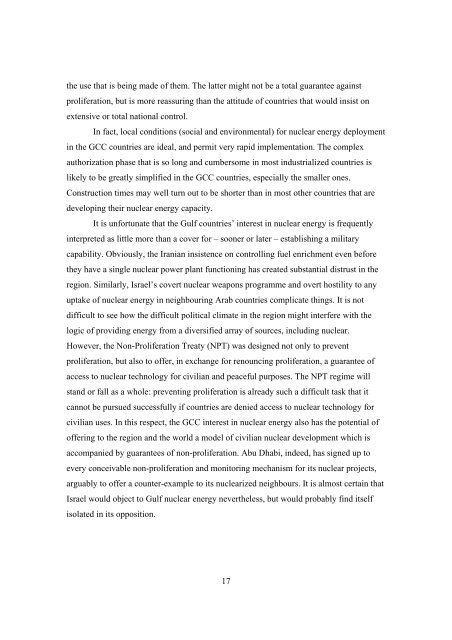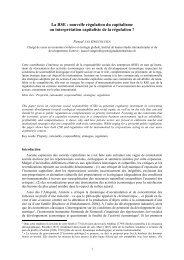PDF - Graduate Institute of International and Development Studies
PDF - Graduate Institute of International and Development Studies
PDF - Graduate Institute of International and Development Studies
You also want an ePaper? Increase the reach of your titles
YUMPU automatically turns print PDFs into web optimized ePapers that Google loves.
the use that is being made <strong>of</strong> them. The latter might not be a total guarantee against<br />
proliferation, but is more reassuring than the attitude <strong>of</strong> countries that would insist on<br />
extensive or total national control.<br />
In fact, local conditions (social <strong>and</strong> environmental) for nuclear energy deployment<br />
in the GCC countries are ideal, <strong>and</strong> permit very rapid implementation. The complex<br />
authorization phase that is so long <strong>and</strong> cumbersome in most industrialized countries is<br />
likely to be greatly simplified in the GCC countries, especially the smaller ones.<br />
Construction times may well turn out to be shorter than in most other countries that are<br />
developing their nuclear energy capacity.<br />
It is unfortunate that the Gulf countries’ interest in nuclear energy is frequently<br />
interpreted as little more than a cover for – sooner or later – establishing a military<br />
capability. Obviously, the Iranian insistence on controlling fuel enrichment even before<br />
they have a single nuclear power plant functioning has created substantial distrust in the<br />
region. Similarly, Israel’s covert nuclear weapons programme <strong>and</strong> overt hostility to any<br />
uptake <strong>of</strong> nuclear energy in neighbouring Arab countries complicate things. It is not<br />
difficult to see how the difficult political climate in the region might interfere with the<br />
logic <strong>of</strong> providing energy from a diversified array <strong>of</strong> sources, including nuclear.<br />
However, the Non-Proliferation Treaty (NPT) was designed not only to prevent<br />
proliferation, but also to <strong>of</strong>fer, in exchange for renouncing proliferation, a guarantee <strong>of</strong><br />
access to nuclear technology for civilian <strong>and</strong> peaceful purposes. The NPT regime will<br />
st<strong>and</strong> or fall as a whole: preventing proliferation is already such a difficult task that it<br />
cannot be pursued successfully if countries are denied access to nuclear technology for<br />
civilian uses. In this respect, the GCC interest in nuclear energy also has the potential <strong>of</strong><br />
<strong>of</strong>fering to the region <strong>and</strong> the world a model <strong>of</strong> civilian nuclear development which is<br />
accompanied by guarantees <strong>of</strong> non-proliferation. Abu Dhabi, indeed, has signed up to<br />
every conceivable non-proliferation <strong>and</strong> monitoring mechanism for its nuclear projects,<br />
arguably to <strong>of</strong>fer a counter-example to its nuclearized neighbours. It is almost certain that<br />
Israel would object to Gulf nuclear energy nevertheless, but would probably find itself<br />
isolated in its opposition.<br />
17




